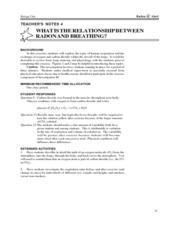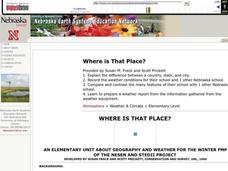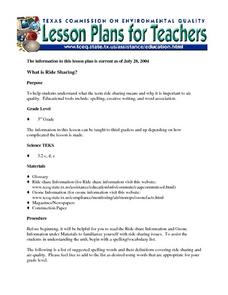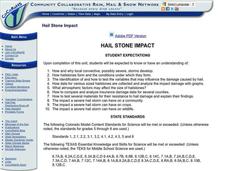Curated OER
What Is The Relationship Between Radon and Breathing?
Students examine the effects of radon on their breathing. They review the anatomy of the respiratory system before completeing this lesson. They also complete equations to show how carbon dioxide forms in their body.
Curated OER
Science: Hurricanes As Heat Engines
Young scholars conduct Internet research to track the path of Hurricane Rita. They record the sea surface temperature of the Gulf of Mexico during and after the hurricane and draw conclusions about how hurricanes extract heat energy...
Curated OER
Science: Trouble in the Troposphere
Students research a NASA Website and record information about an assigned city's tropospheric ozone residual monthly climate. In groups, they graph the information for the past year. They form new groups and compare their city's...
Curated OER
Warm and Cold Air
Young scholars examine what happens to air when it is heated or cooled. They conduct an experiment using bottles and balloons, record and discuss their observations, and write a hypothesis.
Curated OER
Hurricane Scavenger Hunt
Fourth graders use Internet and/or library resources to locate and record information about hurricanes on a worksheet..
Curated OER
Air Masses
Students examine the physical characteristics of several types of air masses to discover how air masses can be identified and defined by their temperature and moisture content.
Curated OER
Current Interactions
Students design an experiment to see how wind, temperature, and salinity work together to influence ocean currents and present it in a report format. They explain to their classmates how experiment findings relate to ocean currents.
Curated OER
A Message in a Bottle
Students investigate the motion of water currents by mapping the possible movement of messages cast into the ocean in bottles.They accurately plot the appearance of bottles on a world map and illustrate the flow of an ocean current...
Curated OER
Intro to Civil Engineering and Hydrology
Students identify the processes involved in the water cycle. In this math instructional activity, students explain what civil engineers and hydrologist do. They watch a video about flooding in Texas.
Curated OER
Losing An Island
Students examine carbon dioxide and determine the impact of greenhouse gases on the earths spheres. In this pollution instructional activity students complete a lab activity to see the impact of gases on the environment,
Curated OER
Where Is That Place?
Students choose a school in their state to compare their weather to. They also describe the differences between country, state, and a city. They can make flashcards to help them remember the important terms and concepts.
Curated OER
What is Ride Sharing?
Third graders discover the concept of ride sharing. They discuss how it helps the environment. They use the internet to gather information as well.
Curated OER
Is There Really Life on Mars?
Students examine the work of scientists and determine how they test their theories.
Curated OER
Deadly Ascent
Students explore some of Earth's extreme environments and the possible dangers they present. They describe some of the potential dangers found in extreme environments around the world. Students discuss ways to deal with potential...
Curated OER
Forecasting Weather
In this weather instructional activity, students review the different things a meteorologist studies and how they collect weather data. Students compare weather watch and weather warning. This instructional activity has 10 matching and 3...
Curated OER
Weather Vocabulary
In this weather worksheet, 3rd graders study words pertaining to all aspects of weather. Students respond to 19 questions, matching the vocabulary words on the left with the correct definition on the right.
Curated OER
Pipeline to the Coral Reefs
Students discuss the relationship of density to stratification. In this marine science instructional activity, students create a model of upwelling events using cold and warm water. They discuss how water phenomena affect coral reefs.
Curated OER
Acid Rain - Go Away
Students set up an experiment and make observations of the effect of acid rain.
Curated OER
Investigation 5 - Severe Weather
Fourth graders examine severe weather in Utah. They utilize a variety of sources; websites, newspapers, TV coverage and perform research to study the severe weather patterns ffound in Utah.
Curated OER
Weather Chart
Students select at least 6 cities from around the world to keep track of their high and low temperatures over a period of time.
Curated OER
Circle the Earth - Explore Surface Types on a Journey around Earth
Students use CERES percent coverage surface data with a world map in locating landmasses and bodies of water at Earth's Equator.
Curated OER
Hail Stone Impact
Sixth graders study the formation of convective storms and test mock hailstones. they graph and analyze collected data.
Curated OER
Will There Be Ozone Tomorrow
Students collect and analyze real time data. They make comparisons and determinations about the status of ozone in their local area and predict the Ozone level for the next day
Curated OER
Transpiration
Students examine the part that transpiration plays in the hydrologic cycle. They observe how plants play a role in maintaining a stable environment.

























